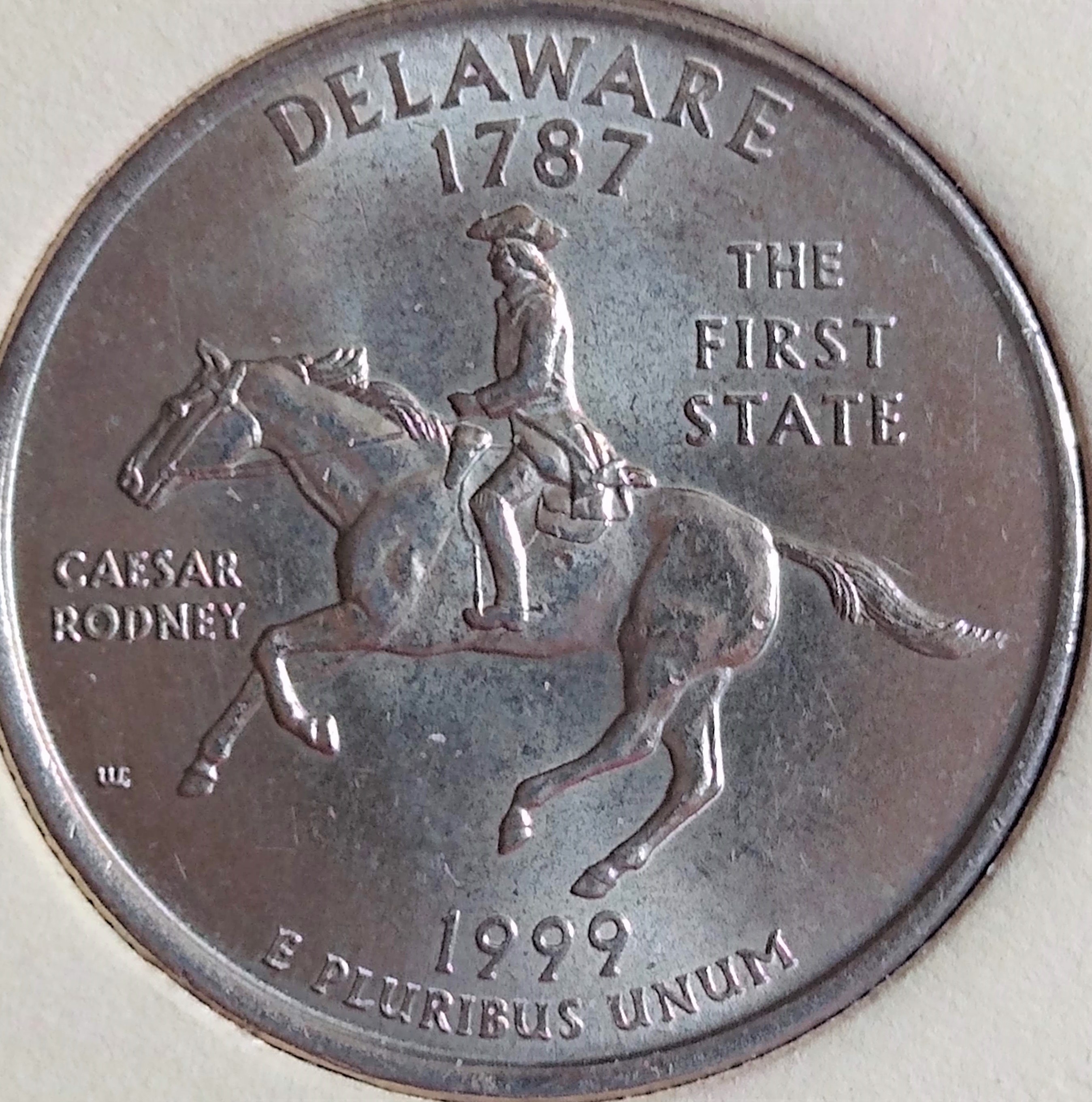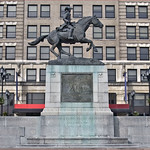To observe Independence Day, I’d like to share with you the story of Caesar Rodney, a signer of the Declaration of Independence.
 Do you have a quarter with the picture of a man riding a horse? Is he wearing a tri-cornered hat and a Colonial jacket with flyaway tails? Paul Revere? Good guess. But it’s a Delaware quarter. The rider is Caesar Rodney—and he is on a journey through thunder and rain to Philadelphia and independence.
Do you have a quarter with the picture of a man riding a horse? Is he wearing a tri-cornered hat and a Colonial jacket with flyaway tails? Paul Revere? Good guess. But it’s a Delaware quarter. The rider is Caesar Rodney—and he is on a journey through thunder and rain to Philadelphia and independence.
Caesar Rodney is Delaware’s favorite folk hero. Despite poor health and a life-long battle with facial cancer, “CR” held more elected offices than any other Delaware elected official—ever. He was the Speaker of the Delaware Assembly, a general in Delaware’s militia, and a wartime governor. But Caesar Rodney is most fondly remembered as a delegate to the Continental Congress of 1776.
Congress is meeting in Philadelphia. It is early June of 1776, and Congress is ready to vote for independence from Great Britain. The vote needs to be unanimous so Britain understands the Colonists are united. But the three men from Delaware, Thomas McKean, George Read, and Caesar Rodney, cannot vote for independence yet because they are under orders from the Delaware Assembly to seek a compromise with England.
Congress postpones the vote for three weeks so the patriots can drum up more support for independence.
Back in Delaware, McKean convinces the Delaware Assembly to break ties with England. This is treason—an act punishable by death. The Delaware Assembly fires the King’s governor and tells McKean, Read, and Rodney they can vote how they see best on the question of independence.
Because Caesar Rodney is the Speaker of the Delaware Assembly, he is now the highest-ranking official in Delaware. You could say he is Delaware’s first governor. One of his first jobs is to go to Sussex County to help calm loyalists who are up in arms about independence.
Once the Loyalists have settled, Caesar returns to his farm near Dover in the middle of the state. It has been an exhausting June for Caesar, and he thinks there is time to rest a few days at home. It’s now the end of June and although the debate and vote for independence in Philadelphia are several days off, Caesar thinks McKean and Read will both vote yes.
July 1 comes, and it is time to vote. Each of the thirteen colonies has one vote. This means the majority of each delegation has to say yes to independence. Delaware has three delegates, but only McKean and Read are there to vote. Nine colonies favor the break with England, but the Delaware delegation is split.
McKean votes yea. But, Read thinks it is too soon to take such a dire move. He votes no! The tie catches McKean by surprise. Without Caesar Rodney, the Delaware delegation is tied. If the patriots are going to get a unanimous vote, they need time to convince three more states to vote yes.
Again, the official vote is postponed; but this time there would be only 24 hours.
Hastily, McKean hires an express rider to go to Dover to get Rodney. If things go well, it will take horse and rider twelve hours to make the 80-mile ride and another twelve to get Caesar back to Philadelphia in time.
McKean’s express rider gallops into Caesar’s farm around midnight.
We think Caesar leaves Dover in the early hours of July 2. The first leg of the journey is in darkness and rain. Even in daylight, Colonial roads are bad. Exposed tree roots, rocks, ruts—now sloppy and muddy from rain—are not good going for a horse on the run. July’s heat and humidity? Not good for a frail man with asthma and cancer who is racing against time. Caesar will have to cross over a dozen swollen streams and creeks. Wooden bridges are unpredictable. A rotted plank, a tripping horse, and history might not be the same.
Lightening illuminates Caesar’s trip northward on the King’s Highway. Thunder booms and rumbles across the flat, Delaware farmland. Rain pelts horse and rider. After sunrise, the rain stops and the July heat builds. They pound on through New Castle and up the post road to Penny Hill north of Wilmington. On to the Naaman’s Creek and into Pennsylvania. Finally Caesar crosses the Schuylkill River at Grey’s Ferry and rides into Philadelphia.
That afternoon, Caesar Rodney, muddy and still in riding boots and spurs, appears at Carpenters’ Hall.
The voting proceeds. A South Carolina delegate changes his vote to yea. Two Pennsylvania delegates are absent—their reasons why we can only guess. Pennsylvania now says yea. New York, still under orders to seek reconciliation, abstains, and technically, that is not a no. Dramatically, Delaware is last.

Caesar Rodney Statue, Rodney Square, Wilmington, Delaware
Rodney says yes!
The tie between McKean and Read is broken. Delaware’s yes gives the patriots the show of unity they need. In two days, on July 4th, the Second Continental Congress will formally adopt the Declaration of Independence. The rest you know.
Photo Credits: Coin/Author’s Collection, Caesar Rodney Statue/Ron Cogswell/Flickr Commons/Link
